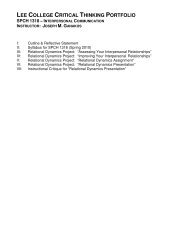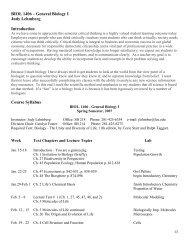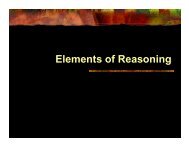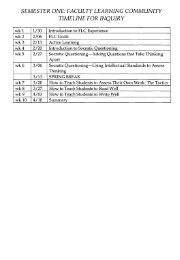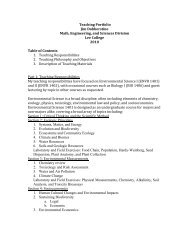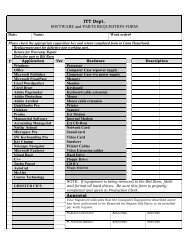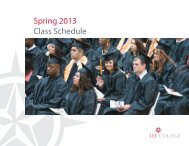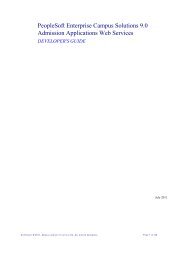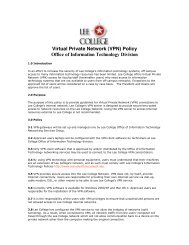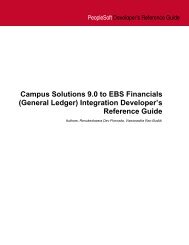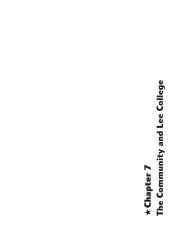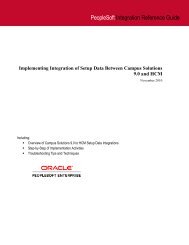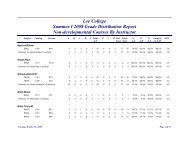Candidate's Statement on Teaching - Lee College
Candidate's Statement on Teaching - Lee College
Candidate's Statement on Teaching - Lee College
Create successful ePaper yourself
Turn your PDF publications into a flip-book with our unique Google optimized e-Paper software.
needed to build their bacteria. They can seek and trade for missing parts with other teams. Some<br />
parts (e.g cell membrane, genome, ribosomes) will be required for all bacteria, while some parts<br />
are required for <strong>on</strong>ly specific riddles. Not all cards have to be used, but students do have to meet<br />
all the requirements of each riddle. Once the riddle is solved, and the cell has been made, each<br />
group will write a <strong>on</strong>e minute paper about how they came to solve the riddle and the significance<br />
of each individual part they used to make their bacterium. For example, a team may receive a<br />
riddle that says:<br />
“I am a tough little bugger that can survive nearly any thing you throw at me. Normally<br />
I d<strong>on</strong>’t like you guys and would rather be out playing in the mud, but get me in the wr<strong>on</strong>g place<br />
(like a poorly ventilated wound) and I will eat you up.”<br />
This riddle should lead the students to a bacterium that has an extensive cell wall (tough)<br />
and can produce endospores (which are usually <strong>on</strong>ly killed by really stringent c<strong>on</strong>diti<strong>on</strong>s like<br />
autoclaving). This bacterium is normally found in soils (playing in the mud), but can cause<br />
problems if they get into humans where there is little oxygen (like in a poorly ventilated wound).<br />
Once they have built their bacterium, I will let them use their computers or the lab computer to<br />
come up with a specific type of bacteria. This particular bacteria is of the genus Clostridium.<br />
The purpose of this exercise is to better familiarize ourselves with bacterial morphology<br />
and structure. Students must be familiar with the pertinent informati<strong>on</strong> and must interpret this<br />
informati<strong>on</strong> in order to solve the riddle. Their point of view is important to this process as well<br />
as using the informati<strong>on</strong> in order to build their bacterium. The essential c<strong>on</strong>cept that this exercise<br />
should drive home is that the different characteristics of different bacteria determine how<br />
individual bacteria interact with the envir<strong>on</strong>ment (including the human envir<strong>on</strong>ment).<br />
Critical thinking exercise #3: Microbiology Bingo<br />
I thought it might be instructive to include a critical thinking exercise that I tried without<br />
thinking critically about the exercise. There are several discussi<strong>on</strong>s which are heavily laden with<br />
terminology, and students normally just sit and take down the definiti<strong>on</strong>s without thinking about<br />
them, or more often, simply glaze over and think about something completely unrelated to<br />
microbiology. I thought that to keep their attenti<strong>on</strong> <strong>on</strong> microbiology I would give them bingo<br />
cards (see attached) with microbiology terminology at the start of class and told the students that<br />
if they c<strong>on</strong>nected terms linearly all the way across the card the would get five b<strong>on</strong>us points.<br />
They could mark off the terms <strong>on</strong> the sheet <strong>on</strong>ly if I said the term. Clever students could ask<br />
questi<strong>on</strong>s to get me to say certain terms, most just sat and waited for me to say the term. The<br />
purpose of this exercise was to use active learning to familiarize students with microbiological<br />
nomenclature. After that, the exercise fails nearly all of the critical thinking elements. While<br />
most students did indeed pay attenti<strong>on</strong> to what I was saying, they were <strong>on</strong>ly doing so to hear the<br />
term, not to better understand it. I think most actually got less out of this exercise than they<br />
would have normally, because instead of listening to what we were discussing, they were merely<br />
hearing the terms. I will therefore NOT be c<strong>on</strong>ducting this exercise again.



